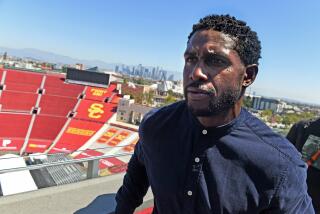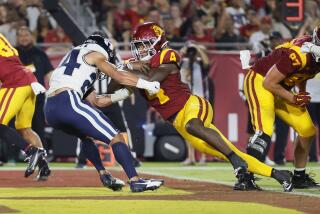NCAA rejects USC’s bid to reduce sanctions
USC’s appeal to the NCAA to modify some of the harshest sanctions in college sports history has been denied, several people familiar with the appeal confirmed Wednesday.
An official announcement is expected Thursday.
“USC has received a response from the NCAA regarding our appeal of NCAA sanctions,” the school said in a statement. “However, under NCAA rules, we cannot comment on this response until the NCAA releases the decision to the public tomorrow morning [May 26].”
The NCAA had no comment.
A USC contingent went before the NCAA’s Infractions Appeals Committee in January and requested that the five-member panel to reduce by half the severest penalties against the football program that were handed down last summer by the NCAA’s Committee on Infractions, which cited USC for a lack of institutional control.
Athletic Director Pat Haden and the school’s legal representatives argued that a two-year bowl ban and the loss of 30 scholarships over three years was excessive. The school sought to have the bowl ban reduced to one year, already served in 2010, and to have the scholarships reduction limited to five a year over three years.
The denial of the appeal was first reported by USCfootball.com.
Before speaking at a booster event in Pasadena on Wednesday night, USC football Coach Lane Kiffin said, “We can’t do anything other than say that we’ve received a decision.”
Kiffin said he would meet with players Thursday after the announcement.
Asked whether he was glad the process was over, he said, “We’re happy that it’s over so now we can move forward and deal with it.”
J.K. McKay, senior associate athletic director, told the crowd he could not comment on the appeal decision.
“This is USC, we’re going to be fine,” he said. “I promise you … whatever happens tomorrow, we’ll be fine.”
USC quarterback Matt Barkley declined to comment beyond saying, “After tomorrow, we’ll know more.”
USC is expected to be stripped of the 2004 Bowl Championship Series trophy it won by defeating Oklahoma in the Orange Bowl. The Associated Press had previously announced that it would not vacate the national title USC won in 2004.
School officials were not optimistic they would be granted relief by the NCAA because only one in 11 appeals had been successful since the NCAA changed a bylaw in 2008 that forces schools to prove “abuse of discretion” by the Committee on Infractions.
Haden has said the school would not seek a legal remedy if the appeal was denied.
Haden, a former USC quarterback and member of the school’s board of trustees, became athletic director last August after incoming President Max Nikias decided to replace Mike Garrett. The overhaul also included the hiring of David Roberts as a vice president for athletic compliance and subsequent hirings to beef up the compliance staff.
The denial of the appeal ends a saga that began in March 2006 when several media outlets reported USC tailback Reggie Bush and his family had allegedly received improper benefits from would-be marketing agents, including living rent-free in a house near San Diego.
Bush, the 2005 Heisman Trophy winner, said neither he nor his family had done anything wrong.
The NCAA launched an investigation that was stalled and delayed because it had no power to subpoena witnesses, including Bush, who was selected No. 2 by the New Orleans Saints in the 2006 NFL draft. The NCAA probe grew to include allegations surrounding former USC basketball player O.J. Mayo.
Bush eventually settled separate civil cases brought by would-be marketers Michael Michaels and Lloyd Lake.
The NCAA’s infractions committee ruled last June that USC lacked institutional control after concluding Bush and Mayo had received improper benefits when they were competing for the Trojans. The NCAA determined Bush became an ineligible player in December 2004.
USC was slapped with four years’ probation, the bowl ban and scholarship reductions and was ordered to eliminate Bush’s and Mayo’s images from campus and school-related publications.
The school removed a copy of Bush’s Heisman Trophy from Heritage Hall in July and sent it back to the Heisman Trophy Trust in New York. Two months later, Bush announced that he would forfeit the trophy.
In January, a USC contingent went to Indianapolis for its appeal hearing, in which it argued the penalties imposed were excessive. Afterward, Nikias thanked the NCAA for the chance to present the case and described the proceedings as “a good and fair hearing.”
In February, with NCAA penalties stayed while under appeal, Kiffin and his staff signed 22 high school and junior college players to letters of intent or scholarship agreements. They, along with eight new players who enrolled in January, give the Trojans 30 new players who Kiffin hopes will help USC withstand the scholarship reductions.
Former USC running backs coach Todd McNair, a central figure in the NCAA inquiry, last month lost his appeal to overturn findings and penalties. McNair’s attorney said the former coach was considering legal action against the NCAA.
More to Read
Go beyond the scoreboard
Get the latest on L.A.'s teams in the daily Sports Report newsletter.
You may occasionally receive promotional content from the Los Angeles Times.











